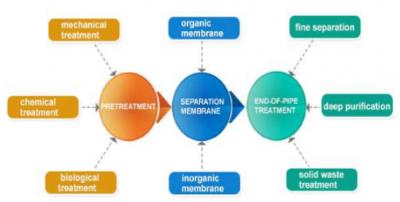Tubular ceramic membranes, as an efficient filtering material, are widely used in many fields. So, what exactly is the filtration principle of tubular ceramic membranes? Next, we will provide a detailed analysis from three aspects: working principle, structural characteristics, and advantages.
Tubular ceramic membranes are a type of water treatment technology based on membrane separation technology. Their operating principle involves passing water through a tubular membrane made of ceramic material. The surface of the ceramic membrane contains micropores, which physically separate impurities, bacteria, and other substances from the water, thus achieving water purification. The pore size of tubular ceramic membranes generally ranges between 0.1 and 0.5 microns, effectively removing organic matter, microorganisms, colloidal particles, and other pollutants from the water.
High Porosity: Tubular ceramic membranes have high porosity, which means that more liquid can pass through the membrane layer, thereby improving filtration efficiency.
Uniform Pore Size Distribution: The uniform pore size distribution of ceramic membranes helps in precisely intercepting particles of different sizes.
Excellent Mechanical Strength: The ceramic material itself has high strength, making tubular ceramic membranes resistant to damage under pressure and ensuring the stability of the filtration process.
Tubular ceramic membranes are highly efficient, stable, and corrosion-resistant, thus being widely used in the field of water treatment. They can be used for seawater desalination, drinking water purification, and wastewater treatment, among others. Among these, seawater desalination is one of the more extensive applications of tubular ceramic membranes. In the seawater desalination process, tubular ceramic membranes can effectively remove salts and other impurities from the water, producing high-quality freshwater.
High-Efficiency Filtration: Thanks to their unique pore structure and material properties, tubular ceramic membranes can achieve high-efficiency filtration, effectively removing suspended solids and impurities from liquids.
Long Service Life: Ceramic materials are wear-resistant and corrosion-resistant, providing tubular ceramic membranes with a long service life and reducing maintenance costs.
Wide Range of Applications: Tubular ceramic membranes are suitable for filtering a variety of liquids, such as in water treatment, chemical processing, and the food industry, demonstrating a broad application prospect.
In summary, the filtration principle of tubular ceramic membranes, owing to its unique working principle, structural characteristics, and advantages, holds a significant position in the filtration field. With continuous technological advancements, it is believed that tubular ceramic membranes will play an even more important role in the future.




 +86-25-58849045
+86-25-58849045
 +86-25-58749295
+86-25-58749295
 jiuwu@jiuwu.com
jiuwu@jiuwu.com
 No. 9 Park Road, Pukou District, Nanjing City (Sanqiao Factory)
No. 9 Park Road, Pukou District, Nanjing City (Sanqiao Factory) Call us on:
Call us on:  Email Us:
Email Us:  No. 9 Park Road, Pukou District, Nanjing City (Sanqiao Factory)
No. 9 Park Road, Pukou District, Nanjing City (Sanqiao Factory)

 English
English 한국어
한국어 français
français русский
русский Español
Español

